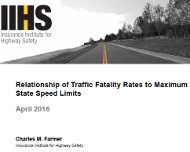4/13/2016
Opinion: Insurance Industry Claims 32,894 Deaths From Higher Speed LimitsInsurance industry study claims that lives were lost by repealing the 55 MPH speed limit, despite record low fatalities nationwide.

The insurance industry is going all out in its ongoing campaign to lower speed limits nationwide. The industry's public relations arm, the Insurance Institute for Highway Safety (IIHS) was the leading advocate in favor of keeping the national maximum 55 MPH speed limit, opposing its ultimate repeal in 1995. On Tuesday, the group claimed 32,894 lives were lost as a result of the repeal of the double nickel.
IIHS spokesman Charles M Farmer set the tone for his report by opening with the loaded phrase "speed kills." He notes that since the repeal of the 55 limit, ten states have adopted a 75 MPH limit, six have 80 MPH and one has 85 as the top speed. The dilemma for the insurance industry is that despite the high speeds, traffic fatalities are at record lows. For 2014, the fatality rate per hundred million miles traveled was 1.01, less than half the 2.1 fatality rate in 1990 when the national speed limit was in place.
The National Motorists Association, which lobbied for the repeal of the 55 limit, was not impressed by the quality of the latest IIHS research, saying it is nothing new.
"Every few years, IIHS dusts off a 'higher speed limits have killed tens of thousands of drivers' report, mixes in more data, and inevitably comes to the same conclusion," NMA President Gary Biller told TheNewspaper. "The problem the Insurance Institute has is that there are several instances –- Utah increasing I-15 speed limits to 80 MPH in 2009 and Ohio going from 65 to 70 MPH in 2011 are just two examples -– where the years following higher limits were some of the safest on record for those states."
To get around this, Farmer created a statistical model that made assumptions about the impact of the driving age, unemployment rate, alcohol consumption per capita and other factors to create an "expected" reduction in traffic accidents had the 55 limit been kept. Farmer's model claimed there would have been 33,000 fewer deaths from 1995 to 2013 had the speed limit been kept low nationwide. As the report is self-published, the IIHS methodology and data cannot be verified.
IIHS and its backers are not making the same claim that they made during the congressional debate that repealed the 55 limit. In every case, they insisted there would be an immediate cost in blood for the higher speeds -- not an increase that only exists when compared against an imaginary standard.
"It should be obvious that the death toll will rise once the states begin increasing the speed limits under the provisions of the bill," US Representative Nick J. Rahall II (D-West Virginia) said during the 1995 debate. "This is not a matter of states' rights, it's a matter of human rights."
The death toll never rose, but there is a financial reason for the insurance industry's advocacy of artificially low speed limits. Every ticket issued on an underposted road raises the insurance premium for the ticketed driver, increasing the industry's profit.
A copy of the new IIHS report is available in a 900k PDF file at the source link below.


